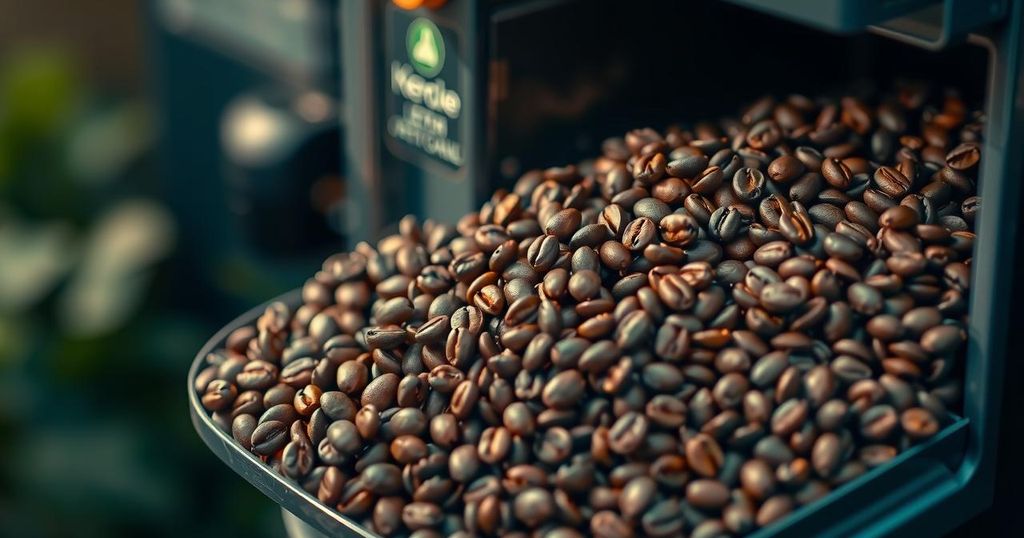The United Kingdom’s coffee consumption leads to substantial waste, including over 2.5 billion disposable cups and half a million tonnes of coffee grounds annually. Innovators like ButterflyCup and companies such as Ernie and bio-bean are developing sustainable solutions to reduce this waste. Strategies include creating biodegradable cups, utilizing electric delivery vehicles, and converting used coffee grounds into bio-fuel logs. Consumer engagement is essential for the success of these initiatives as the coffee industry shifts towards more environmentally friendly practices.
The United Kingdom’s caffeine consumption results in approximately 35 billion cups of coffee consumed annually, which generates significant environmental repercussions. More than 2.5 billion disposable coffee cups are discarded each year, with nearly half a million tonnes of ground coffee ending up in landfills. The coffee industry also contributes notably to the United Kingdom’s carbon emissions, prompting the government to commit to achieving carbon neutrality by 2050. In response, various coffee companies are devising innovative solutions to address these pressing concerns. One noteworthy innovation is the ButterflyCup, an entirely paper-based disposable cup, free from plastic lining and lids. This cup allows users to create a lid through a two-fold process once the drink is poured. Tommy McLoughlin, the chief executive and founder of ButterflyCup, asserts, “We believe it is the world’s most environmentally friendly disposable cup.” Despite its high production costs compared to traditional plastic cups, the ButterflyCup is economically favorable when compared to compostable options that require separate lids. Although the cup can be pulped similar to cardboard, challenges remain in recycling due to contamination fears among mainstream recyclers. Nonetheless, the ButterflyCup can be composted or allowed to biodegrade naturally. Various sectors of the coffee industry, including packaging materials, emit carbon, underscoring the necessity for a comprehensive reevaluation of production and disposal practices. Rich Riley, co-chief executive of Origin Materials, emphasizes the importance of transitioning from fossil fuel-dependent products to sustainable alternatives. In addition to innovative packaging, businesses such as Ernie, a London-based company, have adopted sustainable practices by utilizing an electric milk float dating back to 1963 for coffee delivery. Through reusable containers, Ernie aims to significantly reduce single-use plastic, despite facing challenges during the pandemic that led to a shift in their delivery model. Moreover, bio-bean, another UK innovator, transforms unwanted coffee grounds into bio-fuel logs, which are offered as a more environmentally friendly alternative to traditional logs. Finnish company Rens similarly repurposes used coffee grounds to create eco-friendly trainers, demonstrating the versatility of coffee waste. Although single-use coffee pods have experienced a surge in popularity, developments in compostable pods now allow for a more sustainable disposal method, effectively leveraging a circular economy. Companies are striving to adapt the UK’s coffee culture to incorporate more environmentally responsible practices, but their success hinges on consumer engagement and willingness to embrace these changes.
The coffee industry in the United Kingdom generates considerable waste and carbon emissions due to the high volume of coffee consumption, estimated at 35 billion cups per year. The environmental burden is exacerbated by the disposal of billions of coffee cups and used coffee grounds that contribute to landfill waste. In pursuit of sustainability, numerous companies are developing innovative solutions that aim to reduce waste and promote eco-friendliness within the coffee sector. These efforts reflect a broader initiative in various industries to transition towards sustainable practices and achieve long-term environmental goals.
In conclusion, the initiatives undertaken by various companies to mitigate the environmental impact of coffee consumption reveal a concerted effort to transition towards sustainable practices. The developments surrounding products like the ButterflyCup and the operations of companies such as Ernie and bio-bean highlight innovative approaches to waste reduction and sustainability. The ongoing challenge will be to engage consumers effectively and encourage the adoption of these eco-friendly alternatives. As Rich Riley aptly states, addressing these global challenges requires concerted collaboration and consumer interest in embracing sustainable practices.
Original Source: www.bbc.com






